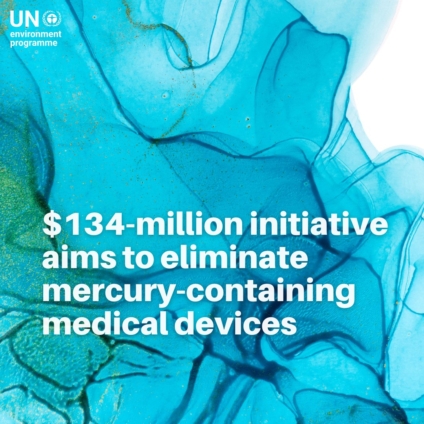A project amounting to $134 million has been launched in five countries - Albania, Burkina Faso, India, Montenegro, and Uganda - to phase out the use of mercury in medical devices, tackling a major source of chemical pollution.
Despite its toxic properties, mercury has been used in healthcare for centuries, endangering human health and the environment.
Medical equipment like thermometers and blood pressure monitors (sphygmomanometers) contain mercury, which poses no risk as long as they remain intact.
However, when these devices are damaged or disposed of, the mercury inside can leak out and evaporate, releasing toxic fumes that put healthcare workers and patients at risk. Inhaling these fumes can lead to serious health problems, including lung, kidney, and nervous system damage.
Experts say the waste generated by these devices can contaminate the surrounding area and a facility's wastewater, causing further environmental harm.
The phasing out mercury measuring devices in healthcare project, led by the United Nations Environment Programme (UNEP), funded by Global Environment Facility (GEF), with the World Health Organisation (WHO) as the implementing agency, aims to develop and implement nationwide strategies to eliminate the use of mercury-containing thermometers and sphygmomanometers.
The project will encourage the adoption of safe, affordable, and accurate mercury-free alternatives, while improving the management of mercury-containing medical waste.
This initiative is part of the One Health approach, which addresses the intricate connections between human, animal, and environmental health, as emphasised by Director of UNEP's Industry and Economy Division, Sheila Aggarwal-Khan, .
“This initiative is significant, not just for protecting our well-being but because it reduces the impact of healthcare on our shared environment.”
The five-year project will help each country align with global standards, training procurement officers on the benefits of alternative devices and raising awareness among manufacturers and the public, in line with WHO guidelines and the Minamata Convention on Mercury.
Scientists say certain digital thermometers offer equivalent clinical accuracy at a lower cost, with some being up to one-third cheaper than mercury-based thermometers when considering their full lifecycle.
Director of Public Hygiene at Burkina Faso's Ministry of Health and Public Hygiene, Dr Anta Zida, emphasised the country's commitment to reforming its healthcare sector to meet international obligations and best practices.
“Eliminating medical devices containing mercury in healthcare facilities is saving lives and protecting the environment,” she said.
According to Director of Climate Change, Environment and Health at WHO, Dr Maria Neira, the primary goal of the healthcare sector is to safeguard and enhance public health.
She stated that, the project will showcase the healthcare sector's vital leadership role in embracing sustainability and setting an example for others to follow, further emphasising the sector's commitment to protecting the environment and promoting a healthier future.
“The healthcare sector serves to protect and improve public health; this project will further demonstrate the important leadership role that the sector has in promoting sustainability,” said Dr Neira.
The project seeks to gradually eliminate mercury-containing thermometers and blood pressure monitors at a rate of 20% annually, resulting in a significant reduction of 23,350kg in mercury spillages and positively impacting the lives of approximately 1.8 million individuals.
Latest Stories
-
The Conscience of Leadership: A call to President Akufo-Addo on Ghana’s environmental devastation
24 mins -
Ghanaian youth unaware of their right to hold politicians accountable – Youth Bridge Foundation
1 hour -
Judge delays Trump sentencing for a third time
2 hours -
2024 WAFCON: Ghana drawn against defending champions South Africa in Group C
2 hours -
Photos from DW-JoyNews street debate on ‘galamsey’
3 hours -
Mimmy Yeboah: Blending heritage with global sophistication, confidence redefined through couture
3 hours -
100 Most Influential People Awards 2024: Brain Hill International School’s Director Mary Anane Awuku honoured
3 hours -
Akufo-Addo commissions 97-km Tema-Mpakadan railway line
4 hours -
Majority requests recall of Parliament
4 hours -
Kanzlsperger and Professor Quartey support WAFA with medical Donation
4 hours -
Gideon Boako donates 10 industrial sewing machines to Yamfo Technical Institute
4 hours -
‘Golden Boy’ Abdul Karim Razak honored at WAFU-B general assembly
4 hours -
Buipewura Jinapor secures Vice Presidential position in National House of Chiefs with record votes
4 hours -
2024 election: I want results to come out like ‘milk and honey’ – Toobu
4 hours -
Ghana’s Henry Bukari hands over chairmanship of ECOWAS Brown Card Council of Bureaux
5 hours

